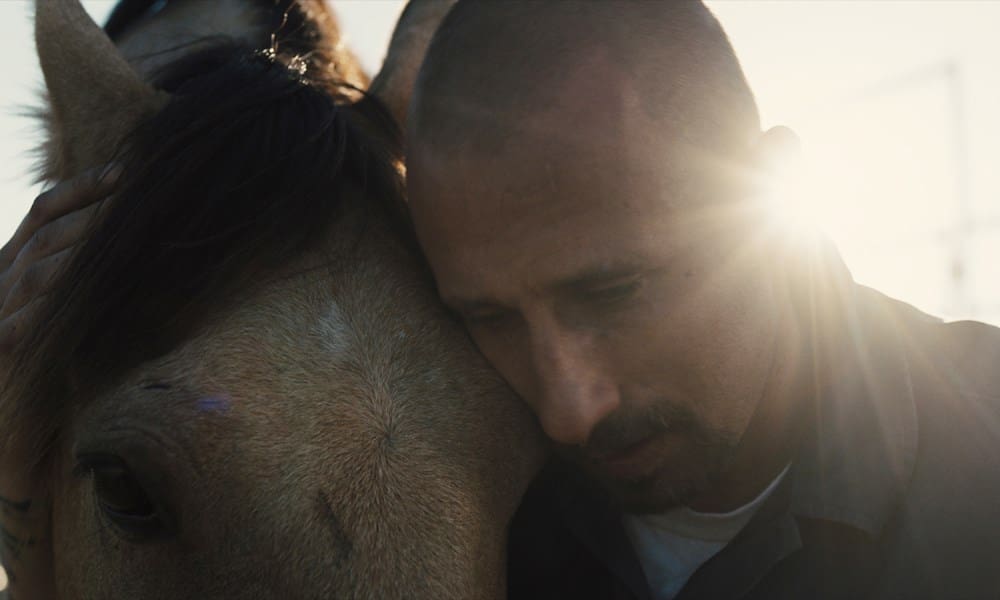
Believe it or not, The Rider and The Mustang are two different movies. The former hit theaters last year, was directed by Chloé Zhao and stars real-life cowboy, Brady Jandreau, as a rodeo rider struggling to define himself after a career-ending injury. The latter hits theaters this weekend, is directed by French actress Laure de Cleremont-Tonnerre and stars actor Matthias Schoenaerts as a prisoner struggling to overcome his violent past through training horses. Both use horses or the idea of cowboys to examine modern day ideas of masculinity, but only one succeeds completely. It’s not The Mustang.
Where Zhao’s film was more about man than horse, Cleremont-Tonnere’s links Roman Coleman’s (Shoenaerts) growth to his first time taming a wild mustang he eventually names Marcus. Though the inmate-wild horse training program is a real thing in states like Colorado, Arizona and Nevada (where the film takes place), that central metaphor often feels too heavy-handed. Take the fact that when Coleman first encounters Marcus, he’s kicking at the doors of his paddock, confined alone because he’s too dangerous to interact with the other horses—just like Coleman was before he was transferred. Writers Cleremont-Tonnerre, Mona Fastvold and Brock Norman Brock not-so-subtly draw parallels between the ways the horses are confined and trained and the prison system throughout and Schoenaerts’s layered, earnest performance is often the only thing keeping the film from feeling corny.
Schoenaerts excels at playing the strong, silent, often brutally handsome type in films like A Bigger Splash or Bullhead and he perfectly traces Coleman’s emotional arc here. When we meet him, Coleman is so closed off, he’s almost mute. In his prison entrance meeting with Connie Britton’s social worker, he only speaks in conjunction with a small, violent outburst. His silence and his permanently-tensed upper body are a warning and he’s just as skittish as he titular mustang. It’s thrilling, then, to watch Coleman slowly become more expressive as the film goes on.
Coleman and his daughter, Martha (Blockers’ breakout, Gideon Adlon), share tense visits throughout and while their first encounter follows the exact same trajectory as his meeting with Britton’s character, he eventually opens up in one of the film’s best scenes. For much of the film, the audience is left to wonder how Coleman ended up in jail. We guess from his anger issues that it must be some horrible act of violence, but we don’t learn what it is until that scene. Suddenly, after stone-faced silence for most of the film, Schoenaerts allows Coleman to break down. He’s apologetic and desperate for forgiveness and the moment feels almost cathartic in the way it conveys not only Coleman’s changing relationship to his anger issues, but his own expression of his masculinity.
There are perhaps few things more central to America’s self-image than the lone-wolf cowboy. Though Coleman doesn’t fit that image as well as Jandreau’s character in The Rider, both films compare their central characters to that idea. Where Zhao’s film is about freeing yourself from that image, Cleremont-Tonnerre’s is about keeping the sense of freedom and self-sufficiency while rejecting the emotional distance and violence. Perhaps the most beautiful expression of that goal comes in the scene where the prisoners, dressed in orange jumpsuits, take their horses to the open desert and let them run. The moment at once captures the freedom and promise of the myth of the American West and the irony that these men will soon return to a system that exists to keep them caged. It’s a perfect moment, but the rest of the film can’t quite live up to it.
If The Rider hadn’t come out last year, maybe The Mustang would be more effective. It’s well-directed, includes a great performance by Schoenaerts and questions the idea of American masculinity in a very different way than that film. Where it fails is in its delivery. Despite being based on a real program and–as the credits suggest–real experiences, Cleremont-Tonnerre’s film can work too hard to make its points. It’s heavy-handed more often than it’s profound and it’s impossible to overlook its flaws. Maybe that’s a betrayal of the film’s ultimate message, but it only has itself to blame.
Rating: 5.5/10

